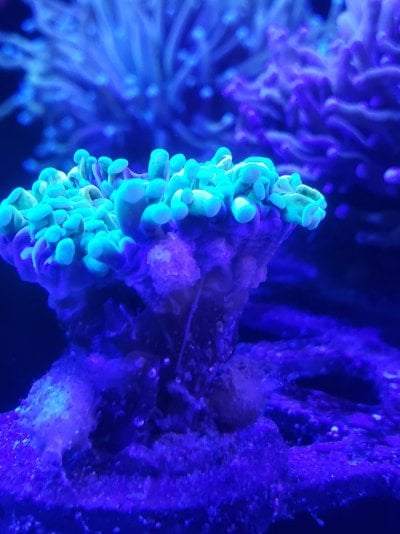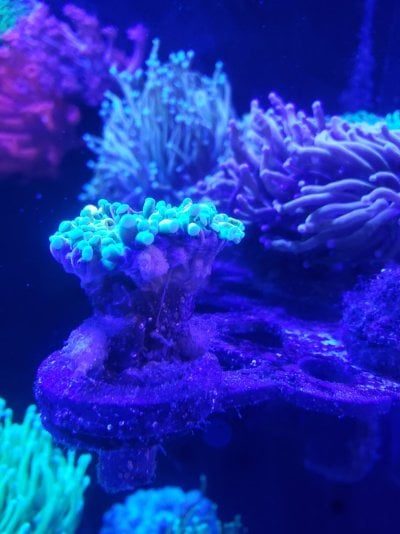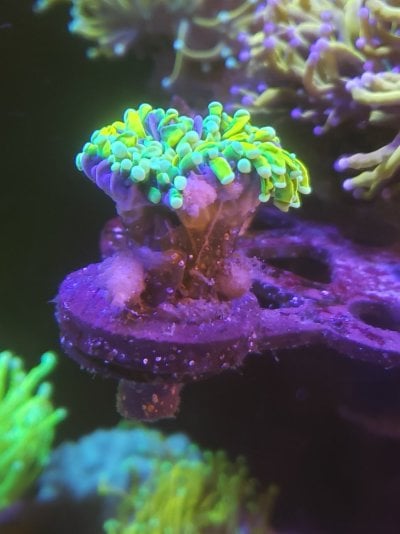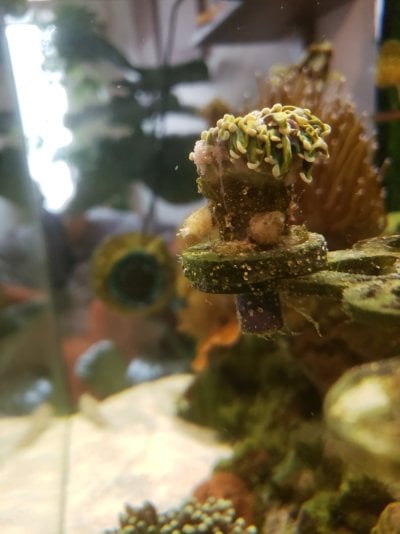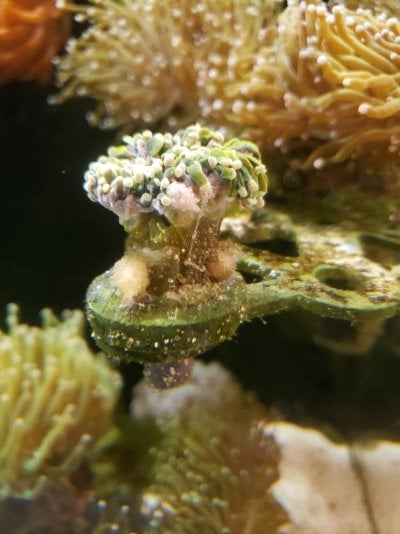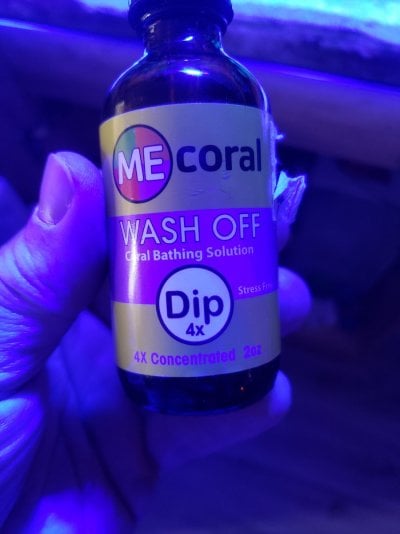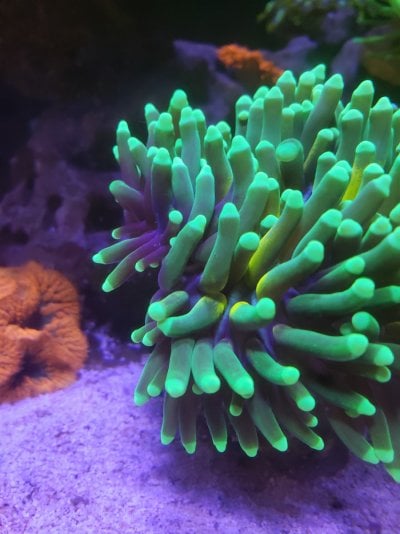Navigation
Install the app
How to install the app on iOS
Follow along with the video below to see how to install our site as a web app on your home screen.
Note: This feature may not be available in some browsers.
More options
You are using an out of date browser. It may not display this or other websites correctly.
You should upgrade or use an alternative browser.
You should upgrade or use an alternative browser.
Fleshy looking lumps under torch coral tissue
- Thread starter Vdlibrtr
- Start date
-
- Tags
- critter id euphelia pest torch
- Tagged users None
Any chance you can upload some pictures of it under white light?
added an orange filter , here's one with white lightingAny chance you can upload some pictures of it under white light?
Attachments
The ones on the coral by the head are mesenterial filaments (a sign of stress/bad health in this case); the ones by the base are pineapple sponges (Genus Sycon) - they're harmless filter feeders.added an orange filter , here's one with white lighting
Agree with @ISpeakForTheSeas, Looks like either pineapple sponge or some other bulbous sponge. Either way harmless
yeah thats what I was worried about! thanks for thr answer... this torch had almost zero tissue when I bought it but during the day its been super fluffy.. would you suggest a dip?The ones on the coral by the head are mesenterial filaments (a sign of stress/bad health in this case); the ones by the base are pineapple sponges (Genus Sycon) - they're harmless filter feeders.
Without knowing what seems to be irritating it, I personally wouldn't, but others might. Is there anything that could be bothering it - something else in the tank (such as a fish, invert, or neighboring coral) maybe?yeah thats what I was worried about! thanks for thr answer... this torch had almost zero tissue when I bought it but during the day its been super fluffy.. would you suggest a dip?
I don't think so.. its neighboring corals have remained the same (more torches) no new additions or anything and my parameters are where they've always been... it looks super irritated in the photo but 20 min later its looking normal... I think it may be just growing pains or something, its right near where it was fragged through what looked like existing flesh so hoping its a one off.Without knowing what seems to be irritating it, I personally wouldn't, but others might. Is there anything that could be bothering it - something else in the tank (such as a fish, invert, or neighboring coral) maybe?
Thanks for all the useful info, ill just keep an eye on it!
Keep a keen eye out for euphyllia-eating flatworms. This kind of behavior can be typical for an infestation, that and tissue recessionI don't think so.. its neighboring corals have remained the same (more torches) no new additions or anything and my parameters are where they've always been... it looks super irritated in the photo but 20 min later its looking normal... I think it may be just growing pains or something, its right near where it was fragged through what looked like existing flesh so hoping its a one off.
Thanks for all the useful info, ill just keep an eye on it!
I actually see little white bugs crawling on multiple torch polyps now. ive had red planaria and euphyllia eating flatworms in the past... reading that interceptor works but might try a coral dip called MEKeep a keen eye out for euphyllia-eating flatworms. This kind of behavior can be typical for an infestation, that and tissue recession
I don't think white bugs affect LPS, @ISpeakForTheSeas any knowelage on this?I actually see little white bugs crawling on multiple torch polyps now. ive had red planaria and euphyllia eating flatworms in the past... reading that interceptor works but might try a coral dip called ME
Most likely they're just pods IMO but always good to be sure
Xarifia gracilipes is a parasitic pod known to go after Euphyllia glabrescens (torch corals), so it's possible:I don't think white bugs affect LPS, @ISpeakForTheSeas any knowelage on this?
Most likely they're just pods IMO but always good to be sure

Aquarium Corals: Stony Coral Parasites: Red and Black Bugs: Identification Guide, Preventive Measures, and a Review of Treatment Protocols
This article is but a small tool for use by serious hobbyists in answering many questions.

Aquarium Corals: Stony Coral Parasites, Part Two: Copepods: Family Xarifiidae
Dana continues last month's discussion about copepods.
I think I did see a thread earlier on an infestation of some sort of white pod/crustacean on a frogspawn.Xarifia gracilipes is a parasitic pod known to go after Euphyllia glabrescens (torch corals), so it's possible:

Aquarium Corals: Stony Coral Parasites: Red and Black Bugs: Identification Guide, Preventive Measures, and a Review of Treatment Protocols
This article is but a small tool for use by serious hobbyists in answering many questions.reefs.com

Aquarium Corals: Stony Coral Parasites, Part Two: Copepods: Family Xarifiidae
Dana continues last month's discussion about copepods.reefs.com
i only have them on two out of ten torches and have found some threads on here about people with the same thing. if it weren't for the unusual mesenterial filaments I wouldn't be concerned.I don't think white bugs affect LPS, @ISpeakForTheSeas any knowelage on this?
Most likely they're just pods IMO but always good to be sure
Some of the threads I've found have suggested a Six line wrasse might eat them... also killed lots of pods with ME coral dip but these guys remain... im probably jumping the gun since the corals are doing well this morning and those filaments went away, so ill wait on a dip to see if the wrasse doesn't do the trick and do some research in the meantime.
pics of the dip and the second coral... the white dots on the left side in the darker areas are all over and skitter around.
Merry Christmas, and thanks for the help everyone
Attachments
Yeah, there's no guarantee these things are an issue (or even that the coral is necessarily unhealthy - I'm not a coral expert, and I'm definitely not an expert with recovering corals), but I'd think it's something to keep an eye on for sure. Since you know what two corals currently have them, I'd say to observe those corals and see if the other one starts potentially showing issues too.
Similar threads
- Replies
- 3
- Views
- 480
- Replies
- 10
- Views
- 512


